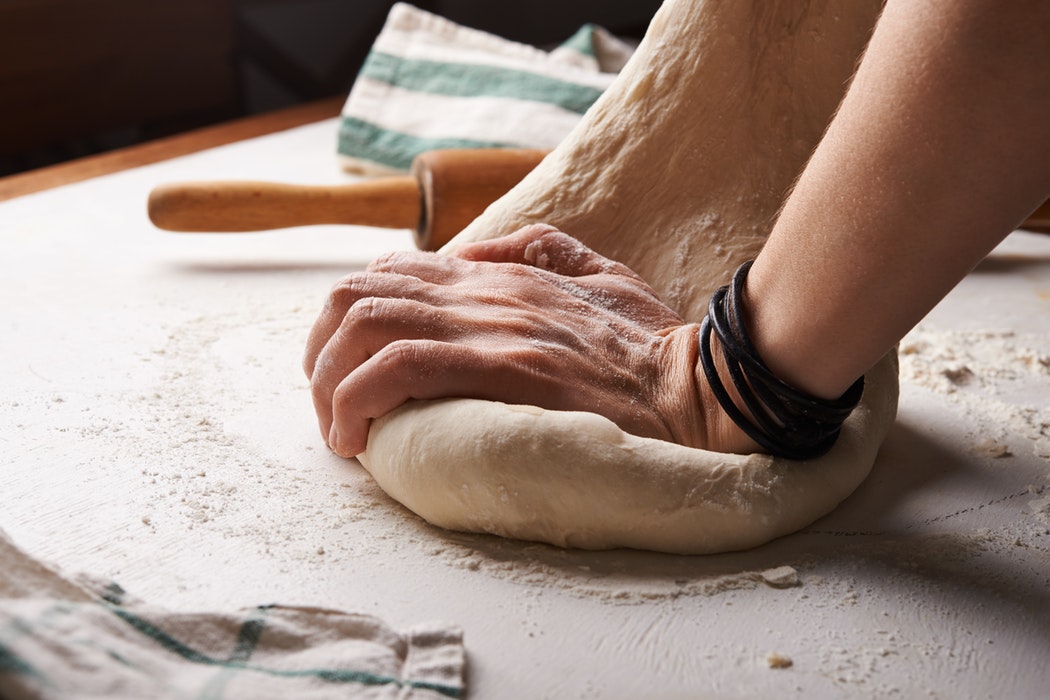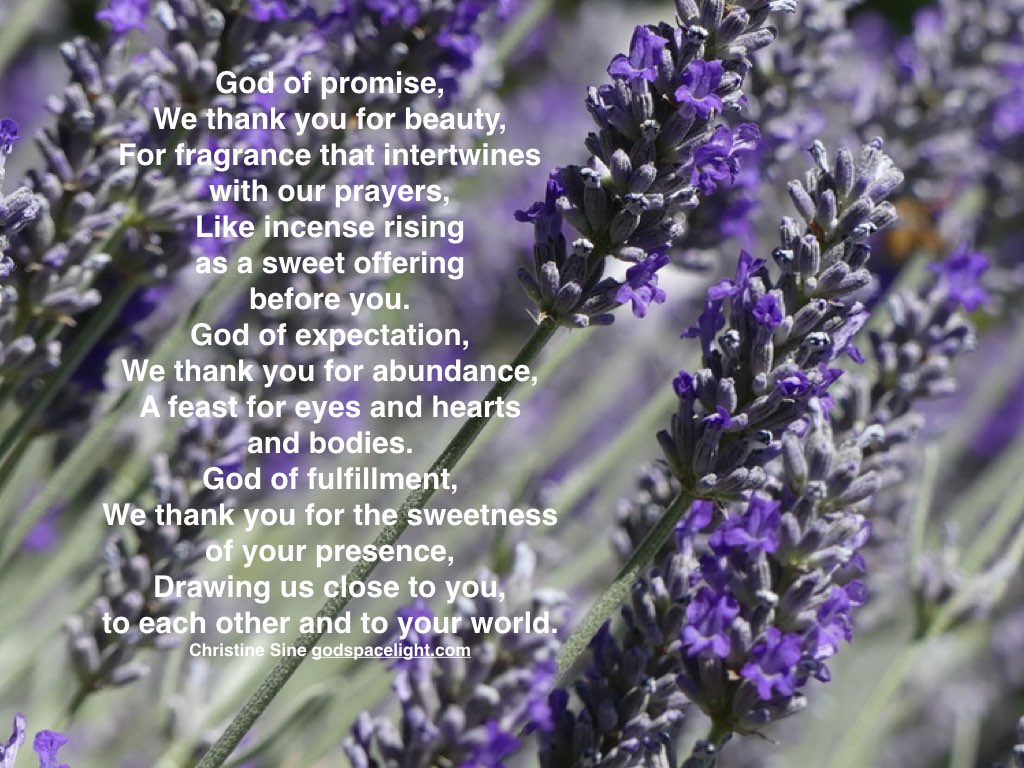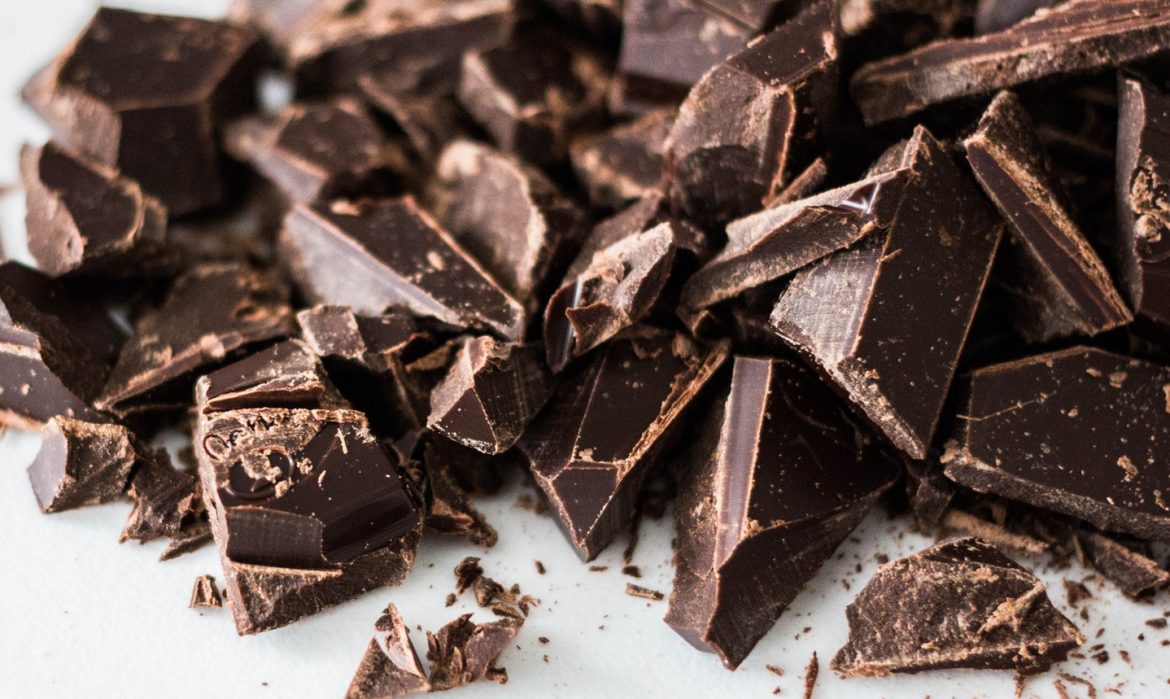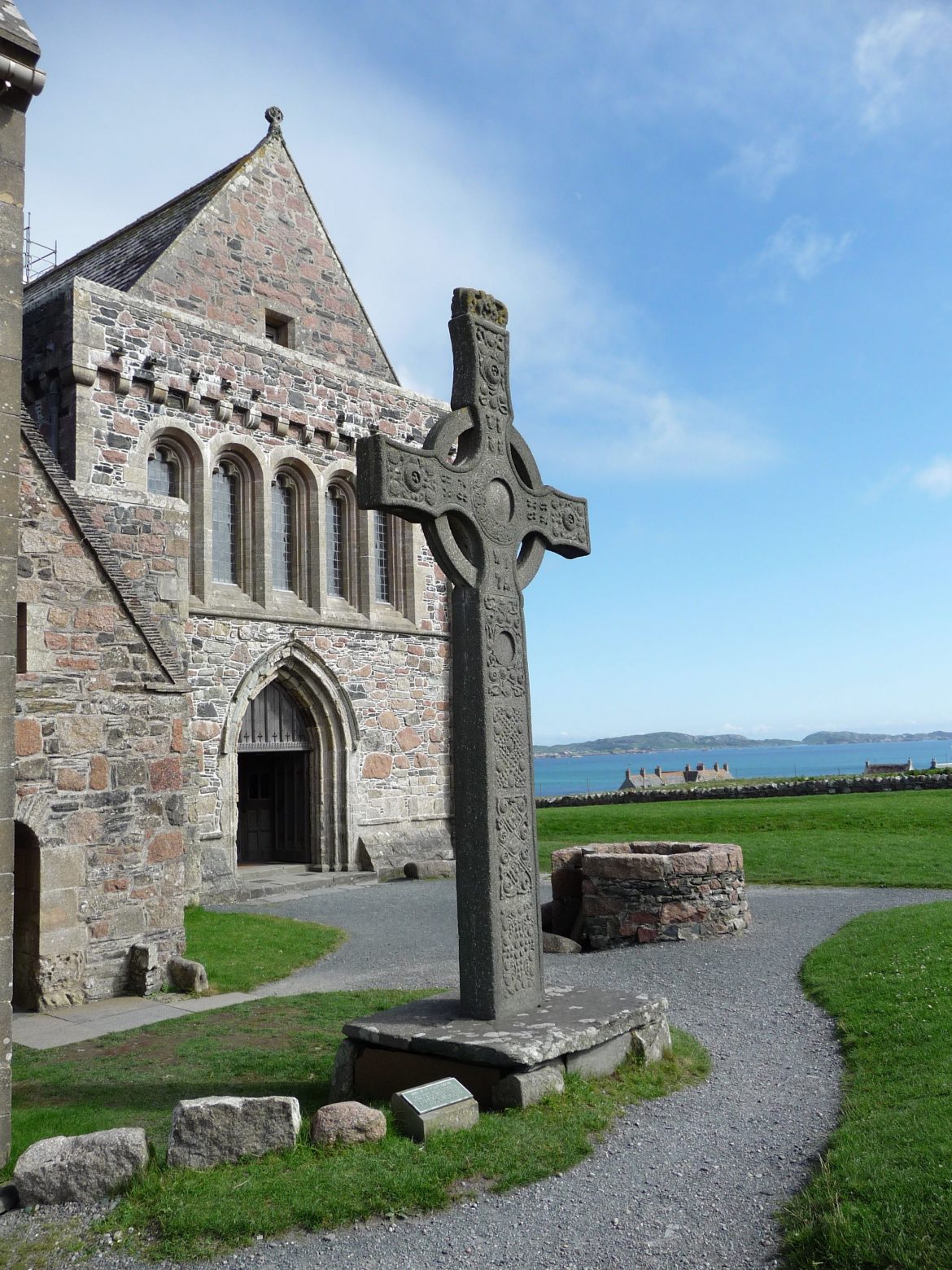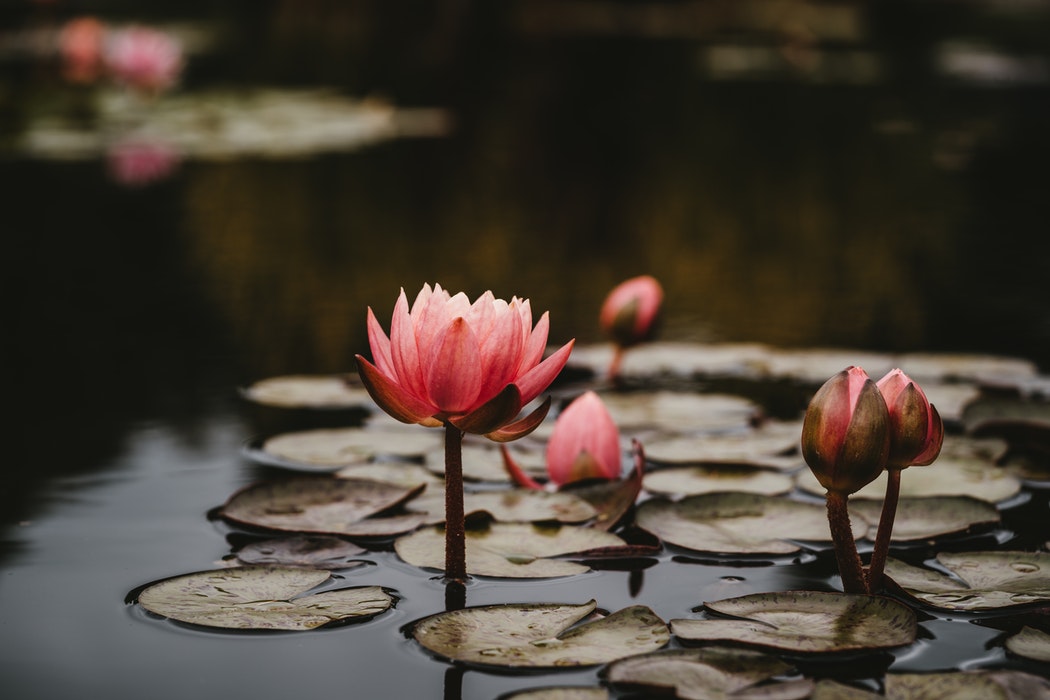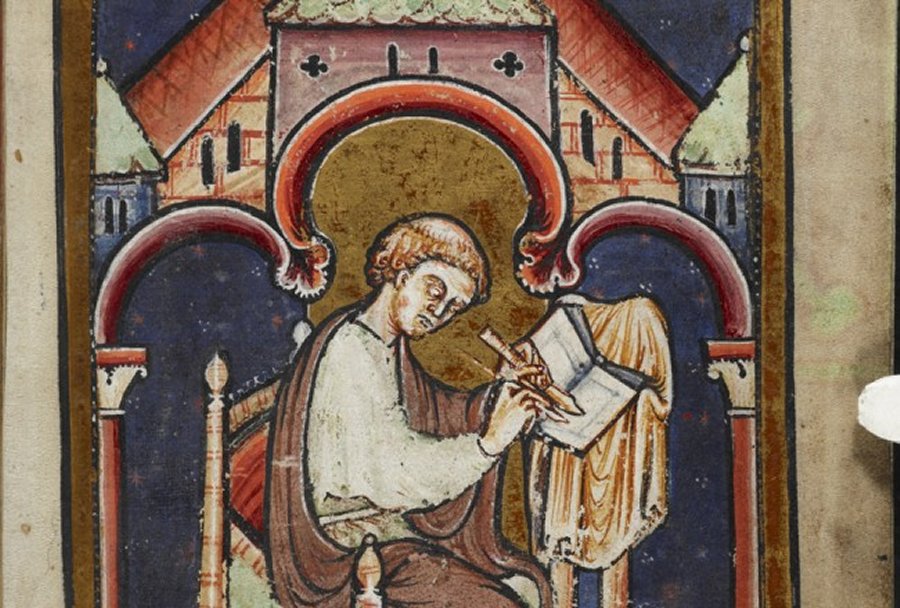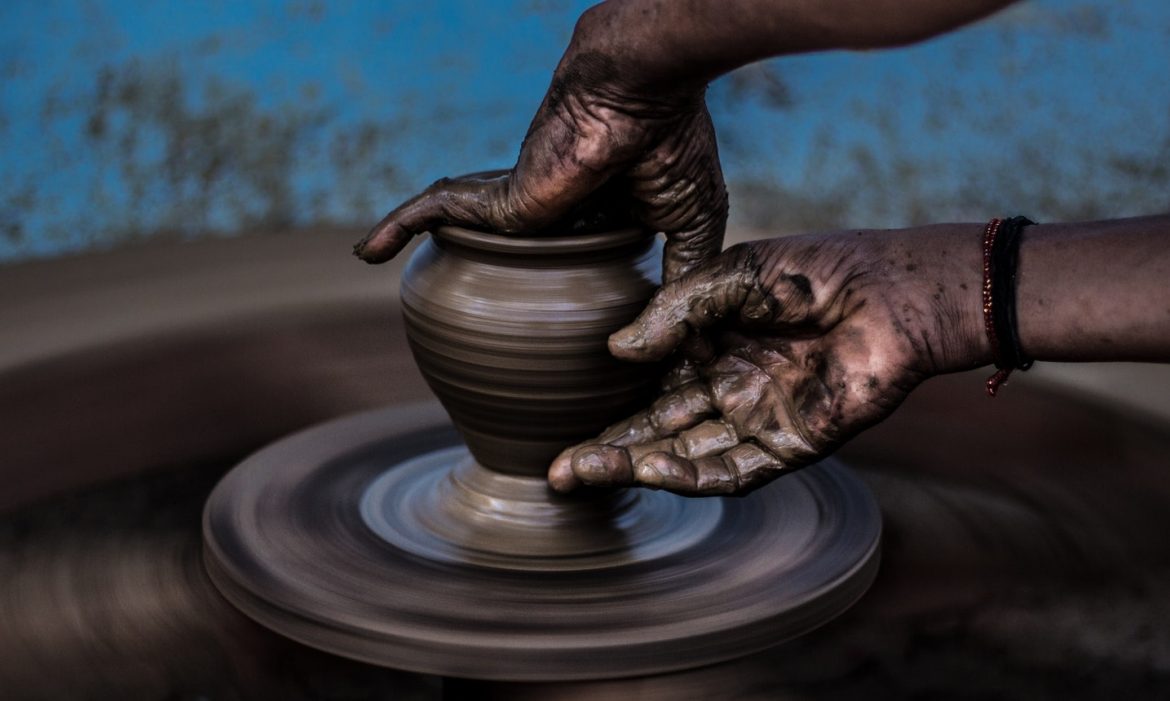By Hilary Horn —
This past spring I felt the Lord telling me to learn how to make bread. I had never made bread in my life and it seemed like a very daunting task. Like some things, I wasn’t totally sure why God had asked me to do this. As the months went by and I practiced this foreign art, I slowly began to realize the lessons he was teaching me through making bread. Some of these included, the power – or lack of power if it’s amiss – of yeast and the parables Jesus uses to explain the Kingdom of God, slowing down to enjoy the process, that not everything happens instantly, waiting and the nutrition of body and soul.
Starting with Yeast
Yeast is a tricky, but seemingly simple part of bread. To make a healthy yeast or sourdough starter, takes about 1-2 weeks. Each day you have to take a little out and add a bit of water and flour to your starter. You can’t forget, or else it goes moldy. Sometimes to make the starter flourish even more, you need to feed your starter twice a day, rather than once. To gain the best results and to not kill off your sourdough starter some best practices are feeding it whole wheat flour, purified water and making sure the environment it’s placed in is the right temperature. All this work and you haven’t even started making a loaf of bread yet!

Sourdough Starter
In Matthew 16:6-12, Jesus warns his disciples, “Watch and beware of the leaven of the Pharisees and Sadducees.” 7 And they began discussing it among themselves, saying, “We brought no bread.” 8 But Jesus, aware of this, said, “O you of little faith, why are you discussing among yourselves the fact that you have no bread? 9 Do you not yet perceive? Do you not remember the five loaves for the five thousand, and how many baskets you gathered? 10 Or the seven loaves for the four thousand, and how many baskets you gathered? 11 How is it that you fail to understand that I did not speak about bread? Beware of the leaven of the Pharisees and Sadducees.”12 Then they understood that he did not tell them to beware of the leaven of bread, but of the teaching of the Pharisees and Sadducees.”
The Scriptures are full of yeast and bread imagery. By taking time to make a sourdough starter, the Lord has been making these passages become more alive. What kind of teaching am I listening to? Is it pure? Is it true? Do I have any bad leaven in my own spirit that needs to be thrown out? Do I have a religious spirit in some areas of my life? What can I feed my soul to give life and resurrection to things that may be flat or dead? Do I help spread the Kingdom of God in my community like Jesus did?
In 1 Corinthians 5:6-7, Paul says, “Your boasting is not good. Do you not know that a little leaven leavens the whole lump? 7 Cleanse out the old leaven that you may be a new lump, as you really are unleavened. For Christ, our Passover lamb, has been sacrificed.”
I killed my first starter. I was lazy and didn’t have purified water one day, so I used my sink water (has too much chlorine because I live in the city). My starter didn’t survive because I put tarnished water in it. I woke up the next morning with a flat starter and I had to start all over again. A week’s worth of work all in the trash. A few weeks later, I killed it again. I left it out too long without feeding it and it molded. In the trash once again it went.
I was understanding the depths of even just a little mistake or neglect can often lead to something drastic in bread. This made me think of my own life too. Yes, we have grace, but often the decisions we make to either short cut something, out of laziness or plain disobedience can set us back drastically or even kill something in our soul or community! I began to think of what some of those “old leaven” was in my life that needed to be taken out. Wether it be pride, quick to anger at my kids, lack of patience for others, listening to what society/culture is saying verses the truth of Scripture, etc. Taking time to really think of such things, to repent and start fresh was life-giving. We don’t have to carry it anymore because of Jesus’ sacrifice which allows us to give our souls pure water, frequently feed our souls because we can commune with God anytime and to make new leaven and be life-givers ourselves.
If I don’t take time to regularly do this and to be cautious of what is going in and out of me than I can be amiss in the power of my life. My life can be an unleavened, flat, Kingdom halter or a flourishing, vibrant Kingdom mover.
Next Step: Bread Dough
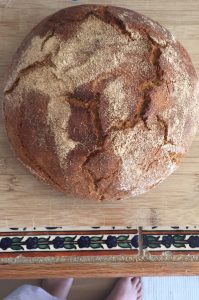
Hilary’s Sourdough Loaf
To actually make bread is also a long process once you have your sourdough starter! I do not use white flour for health/nutritional reasons so I desired to make whole wheat sourdough bread. I found this to be even more complicated on my bread making journey because to get a really good rise, like a white loaf, you have to do some extra steps and the process takes even longer. I adapted this overnight bread to work for us. To make the bread rise better, I have to feed my starter at least 3x that day before I make it at night. You have to make the starter really active. Then before you go to bed, you make your dough with your very active sourdough starter. In the morning when you wake up, you kneed it a little bit and let it rise again for 1-2 hours. Then you flip it into the warmed dutch oven and let it rise again for 30 minutes to an hour. After all this time, THEN you can bake it. Baking it takes about 50 minutes. So to make a single loaf of bread takes a good 2 days. TWO DAYS. But the results are glorious and I am able to feed my family very nutritious, low glycemic, healthy bread.
So what has this process taught me? Not everything happens overnight in our spirituality. In Western society, particularly America, much of our culture is focused around this fast-paced, fast-food, instant results society. We often do not take time for results. I’m convinced that a lot of things like the wide-spread gluten intolerance is because we make fast bread, fast food. If results do not come immediately, we often think we are failures or that something is wrong or we move on to the next thing. Unfortunately that has been engrained in us for decades.
Christians in America even treat churches that way. They hop around places, taking what they want and not ever investing well into their community. Not a cool enough children’s ministry? Move on. Preacher wasn’t charasmatic enough or the worship wasn’t their flavor – see ya later. Whatever the instant issue was, many treat their places of worship as grab and go. They consume it but often do not contribute anything to it. If it doesn’t fit what they want, instead of taking time to invest and maybe be part of the change or helping, they leave for the next big thing. My husband and I have been church planters for the past 3 years and we see this all the time with people that have come in and out of our churches. It just makes me really sad because they don’t know what they are missing if they truly invested in their community rather than just come to get something quick. Yet, even for me in our church plant when I don’t see immediate growth one month, I am not quick to get disappointed about it. Often, building a church or depths of spirituality takes time in your community. Just because I preached a really awesome sermon about justice doesn’t mean everyone is going to be blazing advocates the next day. These growth steps can take a long time to formulate and my perseverance and patience shouldn’t lack just because I may not see it right away.
Bread as given me a deeper understanding that not everything in my spiritual walk is going to be instantaneous. Matthew 13:33 says, “He told them still another parable: “The kingdom of heaven is like yeast that a woman took and mixed into about sixty pounds of flour until it worked all through the dough.” First lets just point out she worked 6o POUNDS of flour. That is an insane amount of flour. One loaf is roughly 1 pound. Can you imagine the process of doing 60lbs – without an electric mixer or industrial sized machinery? This would have taken a VERY long time. The process would be hard on your hands and body. You would need to sacrifice a lot to get the yeast spread throughout all the flour.
This is something God has been showing me. The process of spreading his Kingdom can be strenuous, tiring, take a lot of time, it isn’t instant, but in the end, the results are beautiful. They are unlike anything else and they are so good for your soul. I’ve been asking myself if I am resilient and patient enough to work through a variety of things in my spiritual walk even if it doesn’t instantly happen. Will I stick it out even if the current results kind of suck right now? Or will I just move on to the next thing with out truly working out what is in front of me because it is more convenient? When I do that, what happens to my soul, the people around me or my spiritual journey? How can I include other people in this process? How do I teach my kids to be patient when they don’t get what they want right away? Do I model this for them? If I don’t see healing the first time I pray for someone, do I stop? Give up?
Conclusion
So many thoughts and actions I have been wrestling with just through the process of making bread! The power – or lack of power if your yeast is amiss, the Kingdom of God, slowing down to enjoy the process, that not everything happens instantly, waiting and the nutrition of body and soul.
What are some things you have seen in your spiritual journey that hasn’t happened overnight? Share with us in the comments below.
by Christine Sine
A couple of days ago I received an email from a friend whose acquaintance had taken my liturgical garden idea and run with it. She loved the idea of creating gardens that reflected the season of the liturgical year. She hunted antique stores for a suitable dish, researched plants that had meaning for the liturgical season she wanted to focus on and got to work. I was impressed.
We are now into ordinary time and here in Seattle summer is in full swing. This is not a season for creating liturgical gardens, but it is a season for reflecting on the garden and what it can teach us about God.
Where do I encounter God in the garden at this season? is a question that has held my attention this week.
Beauty, fragrance and abundance are the words that come to mind and nothing represents these more for me than the lavender that is currently flourishing in my garden. It is a reflection of God to me.
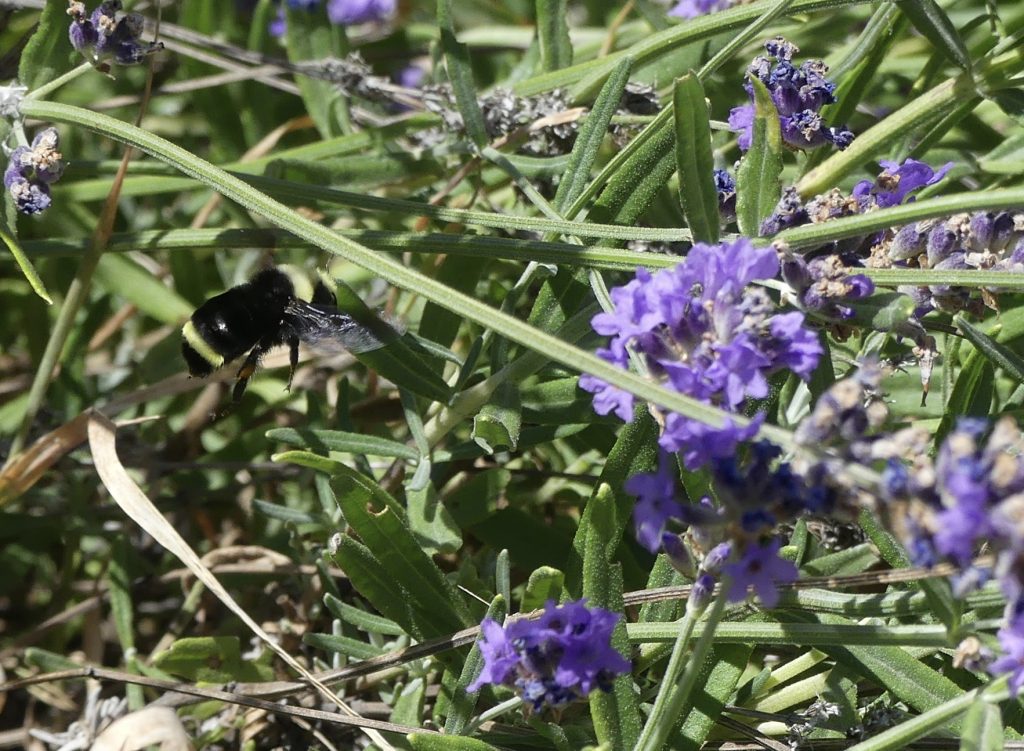
bee on lavender
Lavender is Beautiful
It’s tiny flowers are intricate purple miracles strung together on a stem – not regular and ordered but seemingly haphazard and random. I love them. They are a feast for my eyes. I love their brilliant coloured heads that sway gently in the breeze. I watch the busy insects swarm to them – bees of every variety, wasps, and other flying creatures I have no names for. Not just a feast for the eyes I realize but a feast of rich pollen too. Their beauty has purpose as I suspect all the beauty of God’s world has if only we will take time to notice and enjoy it.
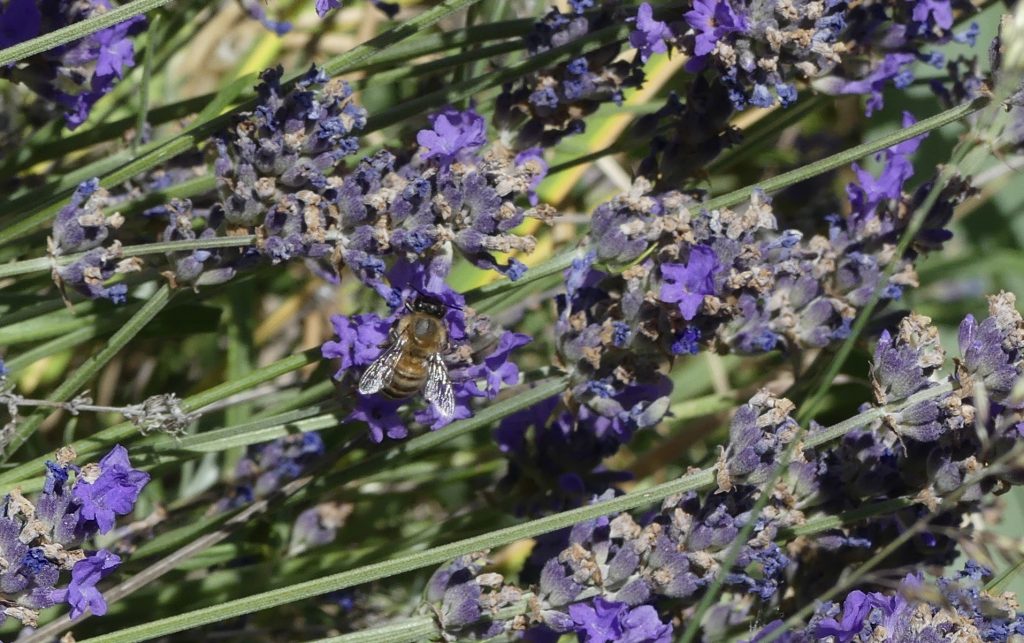
bee on lavender
Lavender is Fragrant
The insects are attracted by the fragrance that wafts towards me on the wind. I brush against the bushes and it clings to me just as I hope the fragrance of God’s presence clings to me as I go to interact with my friends, neighbours and strangers I encounter. I carry the fragrance with me as I walk and mingle it with my prayers, remembering Revelation 8:4 The smoke of the incense, mixed with the prayers of God’s holy people, ascended up to God from the altar where the angel had poured them out. I really do sense that this perfume is more than a delight to my senses. It is a sweet offering that mixes with my prayers and rises like incense before God.
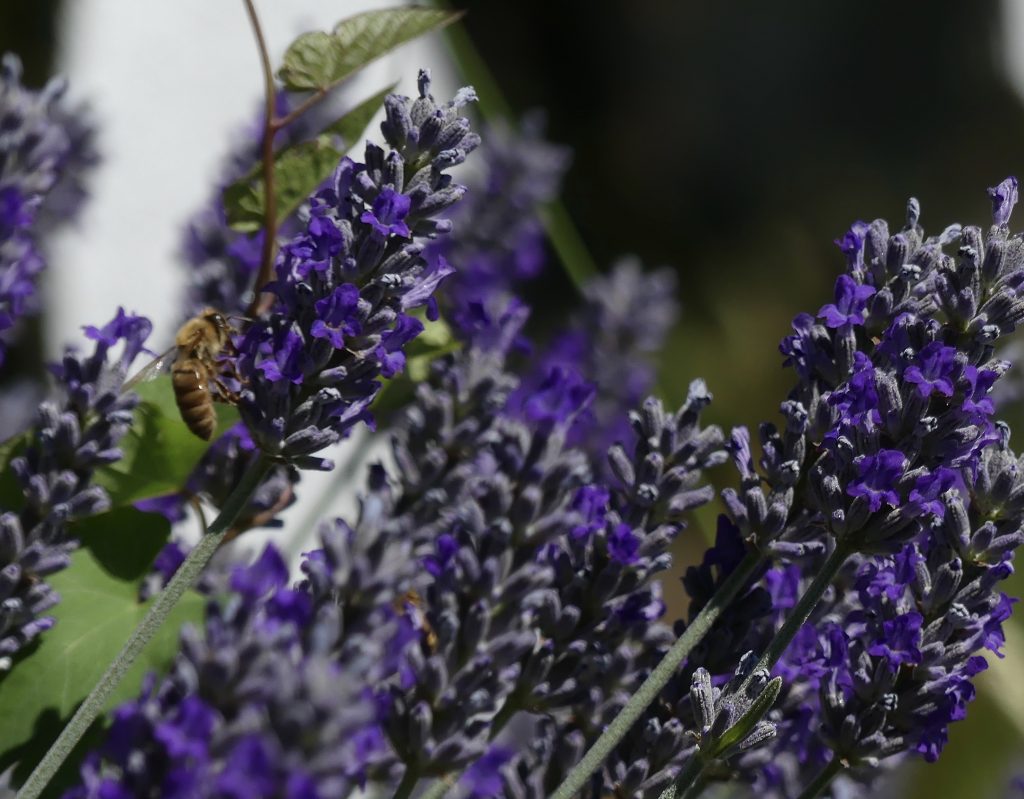
garden lavender
Lavender is Abundant
Lavender is abundant in the Pacific NW at this season. I have three bushes in my garden and not far away there are lavender farms, where lavender is not just harvested and dried but made into oils, soaps, perfumes and all kinds of yummy edible delights. Most of the lavender farms are open for visits and people love to wander through the fields enjoying the beauty and the fragrance.
Lavender is For Sharing
Lavender is a sharing plant. Its bright purple flowers are particularly attractive to insects that feast on its pollen and fly off to share it with their colonies and offspring. It prompt me to share too. I have three bushes in my garden that entice me to pick the fragrant heads and crush them between my fingers. Yesterday I made lavender lemonade, and I am also thinking about other recipes I could experiment with that speak of God’s beauty, fragrance and abundance as I experience through the lavender in my garden.
Tonight at our community meeting we will make lavender wands share the lemonade and discuss what we learn about God from this amazing plant as we work and reflect.
Now as I sit back in my office another verse comes to me – Proverbs 27:9 The heart is delighted by the fragrance of oil and sweet perfumes, and in just the same way, the soul is sweetened by the wise counsel of a friend.
What a beautiful verse to end my reflections with. Lavender doesn’t just speak to me of the fragrance of God, it reminds me too of the sweetness of friendship and the many special friends I have whose fragrance clings to me just as I hope God’s does.
What Is Your Response
You may not have lavender in your part of the world, and if you live in the Southern hemisphere you may not be experiencing the abundance of the Northern summer, but there are still aspects of God’s good creation that speak to us.
Sit prayerfully for a few moments and reflect on what God is saying to you at this season
Where do you see the beauty of God?
What fragrance of God has brushed off on you and clings to you as you walk through the day?
When have you experienced the abundance of God?
What encourages you to share God’s presence, beauty, fragrance and abundance at this season?
Write down your responses or create a prayer, poem, image or song that depicts your responses.
By Lynne Baab —
Is it true that the Aztecs ate chocolate? It would be more accurate to say that the Aztecs drank chocolate, as did the Mayans before them. Evidence of consumption of chocolate dates to well before the Mayans. An archeological site in Chiapas, Mexico indicates that chocolate drinks were common in 1900 B.C.
Did these folks sweeten their chocolate drinks? Usually not, although honey was added occasionally. When the Europeans first encountered chocolate, on Christopher Columbus’s fourth expedition to the New World in 1602, they remarked on how bitter it was. Columbus brought chocolate back to Portugal, and in the next century it spread to other European countries, sweetened with sugar or honey.
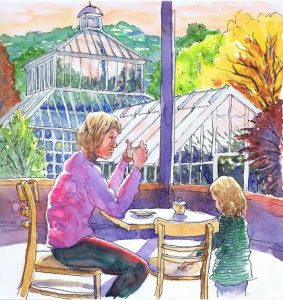
Illustration: A cup of hot chocolate in a beautiful café by Dave Baab
What’s the difference between cocoa and cacao? You can see both names here: the tree that produces cocoa pods is called “theobroma cacao.” When you look on a grocery shelf today, you can often find both cocoa and cacao powder. The same big cocoa pods – six to ten inches long and weighing around a pound – are processed slightly differently to produce the two powders. Usually cacao powder comes from pods that have been dried in the sun, while cocoa powder comes from pods that have been roasted.
Why does a blog on Christian spirituality have a post on chocolate? One reason (of two) relates to the source of most of our chocolate today. About two-thirds of the world’s supply of cocoa pods is grown in West Africa. In sub-Saharan Africa, 30% of children under 15 – more than 1.8 million children – work in agriculture, most of them involved in cocoa farming. About half of that West African cocoa comes from the Ivory Coast, where trafficking, as well as child labor, is common. In 2009, Salvation Army International estimated that of the 200,000 children who help to grow and harvest cocoa in the Ivory Coast, up to 1200 of them may have been trafficked into slavery. So chocolate is associated with child labor and slavery.
Wow! What can we do? One of the commonly proposed solutions is to buy fair trade chocolate, where workers are supposed to receive a fair wage. Unfortunately, that doesn’t appear to be true in the area of chocolate production. In 2014, The Economist stated that fair trade farm workers have a lower standard of living than on conventional farms. Others have criticized fair trade as well. You can google “fair trade debate” and find many articles.
A post on Grist describes ways to access chocolate produced by the most ethical means. Warning: chocolate produced without child labor is expensive!
What’s the other reason for this post on chocolate on the Godspace blog? “Theobroma,” in the name of the tree that produces cocoa pods, means “food of the gods.” Anyone with a tendency toward a chocolate addiction will resonate with that name.
I signed up to research and write this post because of my long history of overeating chocolate. Other people might abuse alcohol or drugs; I have often joked that chocolate is my drug of choice. In recent years I have come to realize that the chocolate-sugar combination functions like an addictive drug for me, even in very dark chocolate which does not contain a lot of sugar. I now use dates or stevia to sweeten cacao powder, and I feel much less compelled to overeat it.
For those of us who struggle with any kind of addiction, one challenge we face is to increase in our willingness to view our addiction as a place where God can work. I spent many years growing as a Christian in some parts of my life, while walling off my over-consumption of chocolate into another area where God was not invited to dwell.
God is in the business of integrating us into whole beings. God wants my eating habits to be part of my discipleship. Likewise, God wants my shopping habits to reflect Christ’s care for all people. Chocolate provides an opportunity to do both.
by Lilly Lewin
I believe in the practice of pilgrimage. Taking time out of our regular life to go on a journey of discovery with God. In the practice of pilgrimage, I have taken students to Holy Island, climbed Crough Patrick in Ireland with my family, visited the Red Light district in Amsterdam, walked the beaches of Normandy, and lived in community on Iona for a week. The Red Light district was one of those gifts of Pilgrimage where the Holy Spirit takes you somewhere you didn’t expect. Our air bnb happened to be right in the middle of everything and this led to some great discussion about where Jesus would go and love people if he were in Amsterdam. Pilgrimages have taught me to think as a pilgrim in my regular life too. They have taught me to take time to notice what God is doing around me and to see interruptions as gifts rather than a curse.
Why a pilgrimage?
For centuries faithful men and women have journeyed together to sacred places.
Think back to Abraham and Sarah going to the promised-land (Genesis 12:1), or the children of Israel going up to Jerusalem every year to worship (songs of ascents in the psalms) and perhaps you remember the colorful pilgrims in Chaucer’s Canterbury Tales from English class. Today people still go on pilgrimage. Some go to Jerusalem to walk the places where Jesus walked and to see where the events of the Bible took place. And young people from all over the world journey to Taize, in France to sing and pray together and live in community. Others walk the Way of St. James in Spain to Santiago de Compostela, known as the Camino.
And I just followed along with Will Parsons as he traveled the Old Way along the southern coast of England where he is reopening an ancient pilgrim trail that I would love to walk someday soon. https://www.facebook.com/pilgrimtrust/?timeline_context_item_type=intro_card_work&timeline_context_item_source=100004325043985
These modern pilgrims seek to connect with God. They are journeying to “thin places” where heaven and earth seem to touch and where they can experience God and feel God’s presence. God speaks to us in the thinplaces of life, along the edges where life is less busy, less noisy and when we are less pre-occupied with the worries of everyday life. God speaks to us in community, because we need each other to grow and expand and process our faith. All of these things can happen on pilgrimage. We too can grow on and in our journey of faith by practicing pilgrimage!
On pilgrimage we can live this out eating together, living together, learning together, traveling together. On pilgrimage, everyone participates. No one just gets to observe. The leaders and participants are all pilgrims. Leaders act as spiritual directors and curators of the experience, but they don’t just direct things. The leader is a pilgrim and is able to engage God and process too.
The Mindset of a Pilgrim.
As pilgrims, we are NOT tourists, we are not just on a trip to see sights, but we are there to be present and learn.
As pilgrims, we are open to new things, new people, new experiences and new places.
Each person that one meets on pilgrimage is a gift, from the crying baby, to the bus driver, to the person you stand behind in line. And even interruptions are seen as opportunities to see God at work. We ask, “What is God showing us and teaching us through this?” As pilgrims, we are on a journey directed by the Holy Spirit and it may not always turn out as we’ve planned! Like standing up on a train from London to Newcastle because you didn’t have the right tickets! You have to ask, “What is the Gift in this Jesus?”
Pilgrimage gets us out of our comfort zones and our regular routines. And it helps us establish habits and practices that can carry our relationship with Jesus beyond the bounds of a church or youth group.
What do you do on a pilgrimage?
A pilgrimage Includes daily times of reflection and prayer. This might include praying the daily office together or a morning prayer time and an evening compline.
We Journey together to a new place.
Pilgrims Live and work in community.
Practice silence.
Practice listening.
Teach and learn from each other.
We have a question to ponder.
Sometimes, we have a saint (or famous Christian ) to travel with and learn about along the way.
There is time to process and ask questions about what we’ve learned as we travel.
There is time for Biblical reflection.
There is time to Rest and just Be with God.
And we take time to learn from the pilgrims who have gone before us.
Pilgrims have an opportunity to meet God on their own…on pilgrimage we ‘create space” to meet with God.
You don’t have to go out of the country to go on pilgrimage, you can go on pilgrimage in your own state and even in your own town.
A mini pilgrimage might include a day trip around your city…praying for the people you see along the way…praying over the police station, the city hall, the fire department, the hospital, buying lunch for a homeless person and listening to his/her story. Worshipping with another congregation in a different flavor.
A local pilgrimage might be Hiking in silence along a trail while pondering a passage of scripture and discussing it at a certain point along the way, processing it together, having time to journal on your own and hiking back out in silence. And processing the experience …
You also might consider a pilgrimage to a “Holy Place” near you…places where God has been worshiped for decades in and around your city/town.
Or you might consider a Civil Rights Pilgrimage learning about the fight for justice in the South our even in your own community.
You can do
Pilgrimage in your neighborhood
Pilgrimage in your city
Pilgrimage in the states
Pilgrimage out of the country
It just means you put on your pilgrim shoes to walk where God takes you and use your pilgrim eyes to notice what God is doing around you! Using Pilgrim ears, taking time to listen to the stories, learn from the people you meet, praying for opportunities and being aware of the Gift when the Holy Spirit interrupts you!
Remember that Jesus was a pilgrim. He wandered around the holy land for three years.
There was a lot of wandering around in the Bible…Abraham, was on a journey to a land that God had promised him…
Moses journeyed around with a bunch of rebellious Israelites for 40years…on a way the way to the promise land.
We too are pilgrims on the way, on a journey with Jesus. We travel together to grow and
“if Jesus is present and actively forming you through your relationship with him, this will take you somewhere!” (sadly I cannot remember who said this!)
Take some time to consider the Practice of Pilgrimage. Where could you go? Who would you want to go with you on your journey? And I will keep you posted on my own. I’m working on plan to lead one to the UK next year the Lord willing!
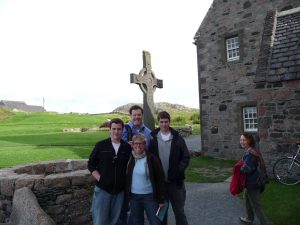
By John Birch from “Ripples” —
Release the gifts within us, Lord
that through fear or hesitation
we have yet to acknowledge or use,
that we might become the Church
you always wanted us to be,
a listening, caring, creative people,
a healing, giving and praying people
filled with the Spirit of love and grace,
your living body here in this place.
“It has always been my delight to learn or to teach or to write.” -Bede
Don’t we love it when we discover our calling and can name what it is that we really like to do in God’s kingdom? St. Paul talks about how we are all given gifts by the Spirit to produce the body of Christ that is whole and complete.
As a youth I desperately desired to be a magnificent singer so that I could sing solos in church. Yet, that desire to sing like an angel was never fulfilled. Instead, I discovered over time that my delight, like Bede was in learning and writing. Instead of singing solos in the pulpit at church, I am a pastor, preacher, and writer with a passion for the Celtic and Anglo-Saxon saints. Yet, I did not fully grasp this gift until I was in my forties.
The Venerable Bede was truly an interesting early 8th century fellow and a renaissance man of sorts. He tells us in his famous Ecclesiastical History of the English People that he was sent to the newly founded Jarrow Abbey in northeast England when he was seven years old. Bede describes how the plague decimated Jarrow and that only the Abbot Ceolfrith and a young boy (likely himself) survived the plague.
I first encountered Bede through an early Celtic/Anglo-Saxon religious leader that he greatly admired and wrote about in his History, St. Hilda of Whitby. Hilda was the Abbess and founder of numerous double monasteries in northern England in which men and women both lived and served under her leadership.
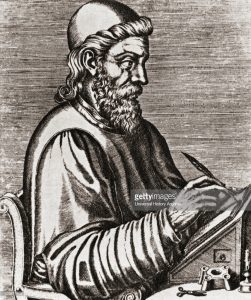 To compose his famous History, Bede used numerous written biographies that he must have had available at the large library at Jarrow. His Bishop, Benedict Biscop had purchased in several extended buying tours to Rome, numerous religious relics, paintings, and books to adorn his new abbeys and their libraries.
To compose his famous History, Bede used numerous written biographies that he must have had available at the large library at Jarrow. His Bishop, Benedict Biscop had purchased in several extended buying tours to Rome, numerous religious relics, paintings, and books to adorn his new abbeys and their libraries.
Bede also interviewed those who lived through the foundational years of early Anglo-Saxon England. One of Hilda’s five students that became Bishops of England, was St. John of Beverley who ordained Bede as a deacon and later as a priest. It is quite likely that John provided Bede with much detail on Hilda’s life. Another person Bede likely interviewed was the historian Adomnán, who was also the 9th Abbot of Iona and the biographer of St. Columba. Adomnan visited the abbot Ceolfrith when Bede was a youth.
Historians throughout the last 1300 years have been grateful for Bede’s love of writing and his desire to make sure that his history was correct. Bede not only wrote his History, but also he wrote books of poetry, hymns, lives of the saints including the Abbots of Wearmouth and Jarrow, and even scientific treatises. A list of all of his writings can be found at
Bede was also known for teaching the younger monks at Jarrow Abbey.
Bede lived in the Wearmouth-Jarrow twin monasteries until he was about sixty-two years old. That’s a long time to live with the same gender in the same place. It is said that even though he had a difficult time breathing and that his feet swelled, he dictated to a scribe his remaining thoughts. The last thing he did was take his little box of the only treasures he possessed in his life and gave away his tiny bit of pepper, napkins, and some incense.
Bede was first buried at Jarrow Abbey and later his remains were translated (moved) to share the same shrine with St. Cuthbert of Lindisfarne in Durham Cathedral. In 1370, his remains were moved one again to his own shrine area in the Galilee Chapel in Durham Cathedral and can still be seen there.
To the end of his life, Bede still so delighted in writing that he was insistent in having a scribe write down his ideas when he no longer had the strength to sit up or hold a quill pen. 1300 years later, Bede still is a teacher as we read his writings and we learn from him.
How are we using our abilities, training, creativity, passions, and inner giftedness to bless God, our family, our neighbor, and perhaps as with the life of Bede, many future generations of learners and seekers after God? Like Bede, may we discover our delight and begin to master this gift that has been given to us through the Spirit of our Living God. Your gift and your calling is needed to make planet earth a better place to live.
Rev. Brenda G. Warren is an ordained Christian Church (Disciples of Christ) pastor and former theological and public library director. She writes about the Celtic and Anglo-Saxon saints on her Celtic 40 days of Advent (Celts to the Crèche) website, www.saintsbridge.org
What do you see in the clay
that might arise out of your moulding,
or in the tree’s wood
alive again
in your hands.
What might you carve,
with a knife and chisel,
and the movements
of a wrist charged
with light.
What words might your pen speak,
if you gave up ownership
of the outcome,
and followed the shapes
ink can make.
What colours or patterns,
might your brush form
on a canvas blank
and waiting
for your mark.
What relationships,
vocations or gifts might be present,
awaiting the
courage to grow
and flourish.
What work might bring
a benefit to all who
drink from the well
of your heart’s
inner springs.
What bird might
be held behind bars,
or river needing a dam of stones
unrolled
to pour forth.
What indeed,
have you caught up inside you,
that yet needs a nudge
to escape
its confines.
Watch how
an over-burden of snow
will gather speed,
as it falls
to become an avalanche.
There are two ways of creating.
Intention, or surrender to the flow.
Neither are wrong.
The only regret may ever be,
in not attempting.
As an Amazon Associate, I receive a small amount for purchases made through appropriate links.
Thank you for supporting Godspace in this way.
When referencing or quoting Godspace Light, please be sure to include the Author (Christine Sine unless otherwise noted), the Title of the article or resource, the Source link where appropriate, and ©Godspacelight.com. Thank you!

